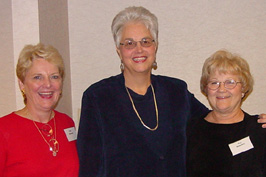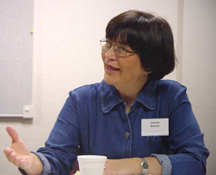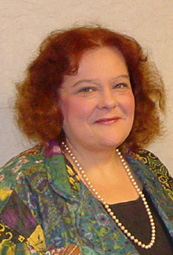 |
Donna Westmoreland, center, with two conference participants. |
The UNMC Health Systems Nurse Specialist (HSNS) graduate program recently sponsored a two-day national conference titled: “Distance Education: From Reality to Quality.”
The Sept. 27-28 conference showcased innovative teaching and evaluation practices used by the College of Nursing faculty, 15 of whom presented at keynote and breakout sessions. Two visiting speakers also presented keynote addresses. In all, 80 participants attended from 15 states and two provinces in Canada. The audience was multidisciplinary with representatives from nursing, physical therapy, radiation science, library science, information technology and medical technology.
College of Nursing Dean Ada Lindsey, Ph.D., provided a historical overview of distance education at the UNMC College of Nursing. “Distance education was an isolated world ‘out there’ in the beginning, but it is rapidly changing to the preferred modality of many learners,” she said.
Sheila Ryan, Ph.D., Charlotte Peck Lienemann and Alumni Distinguished Chair at UNMC College of Nursing, discussed the vision of distance education and how it can improve global health. The morning concluded with a presentation of administrator and faculty perspectives on creating infrastructures to support distributive learning by College of Nursing faculty Carol Pullen, Ed.D, and Donna Westmoreland, Ph.D. Lenore Resick of the Duquesne University School of Nursing in Pittsburgh later presented a successful model for developing and teaching an online advanced physical assessment course.
 |
Lenore Resick |
On Sept. 28, Diane Skiba, Ph.D., University of Colorado Health Sciences Center in Denver, discussed a recent benchmarking study of distance education courses across schools of nursing. Among the key findings of the study: 1) students needed to know up front that distance education learning is more self-directed; 2) younger students were less likely to interact with their peers online than older (over 40) students; and, 3) students spent an average time of six to 10 hours per week on a three-credit-hour graduate course and felt it was too much time.
Karen Grigsby, Ph.D., UNMC College of Nursing, described “Outcome Engineering” and specifically “Journey Mapping,” an evaluation tool to help capture and track the transformative learning experiences of students as they move through an advanced practice curriculum. Journey mapping was initiated this fall with students in the HSNS program.
 |
Diane Skiba |
Participants were challenged to establish a “community of practice” for distance education online and to continue the research and scholarship needed to ensure best practices. The next generation of college students, presenters said, will challenge educators because they do not think of computers as “technology” but more like “toasters.”
(Partial funding was provided by an Advanced Nursing Education Training grant, U.S. Department of Health and Human Services, (HRSA 6 DO9 HP 00049-01).